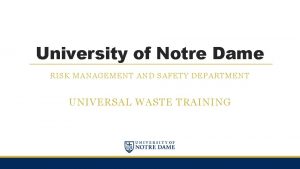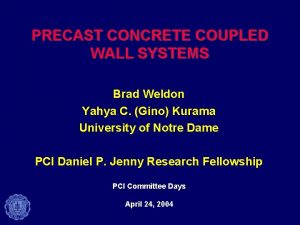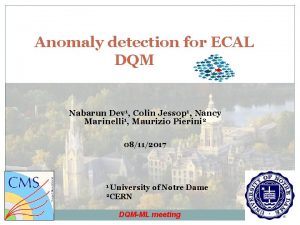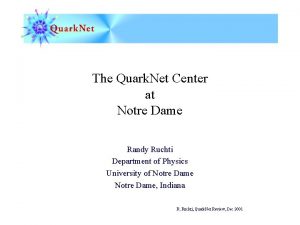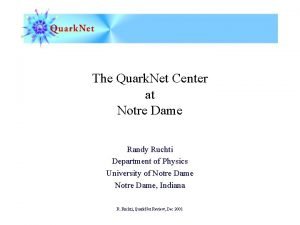Notre Dame Radiation Chemistry Data Center Keith P













- Slides: 13

Notre Dame Radiation Chemistry Data Center. Keith P. Madden Notre Dame Radiation Laboratory

Mission of the RCDC: The Radiation Chemistry Data Center (RCDC) is a service of the Notre Dame Radiation Laboratory to the chemistry, biochemistry, medical, and engineering communities. The mission of the data center is to: • collect numerical property data from radiation chemical and photochemical research literature, • compile, critically evaluate, and assemble this unstructured data into a coherent body of knowledge and, • disseminate it in a useful form for those working with the chemistry of transient intermediates.

Audience of the Data Center. – Our target audience of chemists, biologists, material scientists, physicians, and chemical engineers is diverse, representing numerous organizations: • Government – Environmental remediation at weapon sites, nuclear waste processing, reactor engineering within USDOE – Basic research: radiation chemistry, photochemistry, free radical chemistry • Universities ( radiation biochemistry, oxidative stress) • Industrial laboratories (radiation processing, polymer production) – We provide accurate data for experiment and process design in fields as diverse as power generation, polymer processing, food preservation, pharmaceutical stabilization, radiation therapy, and cloud / aerosol chemistry.

Audience of the Data Center. • Users of the data center, according to domain referenced during web access.

Activities of the RCDC. The activities of the RCDC consist of two major components: First, to collect and perform a continuous, comprehensive review of primary sources in the radiation chemical, photochemical, and free radical literature. • Publication of “Recent Papers in Radiation Chemistry and Photochemistry” Second, to produce and publish critical compilations of chemical property data in the aforementioned areas from the information obtained via the literature review. Dissemination of the information thus compiled is via the RCDC website (http: //www. rcdc. nd. edu) and through publication of data compilations in journals.

Literature review at the RCDC ~ 5000 Papers and monographs per week are produced in chemistry, physics, and closely related fields. Bibliographic citation and abstracts from these papers and monographs are obtained in electronic form. This information is compared to our indexing thesaurus and database of active researchers yielding a set of candidate publications for inclusion in our database. Typically, there are 700 - 900 candidate publications per week. These are examined for relevance. Papers containing chemical property data are indexed for our bibliographic database, and a copy is obtained for compilation construction (~200 per week). The list of relevant recent papers is published on our web site as our current awareness service.

Compilation Preparation and Publication. The current priority: updating “Critical Review of Rate Constants for Reactions of Hydrated Electrons, Hydrogen Atoms, and Hydroxyl Radicals in Aqueous Solution. ” Research papers are collected as part of the literature review. Detailed keywording of research papers, data extraction to XML metadata form, initial data evaluation, preliminary web page preparation and database entry occur in-house at RCDC. External data reviewers check accuracy of web pages and database entries, and evaluate the quality of the numerical data extracted from the paper. Final web pages and database entries are made. Recommended values for the numerical data are made if warranted.

Information access via the RCDC web site Although the RCDC website is accessible without charge, detailed records are kept of visits to the site to enable RCDC personnel to determine appropriate design improvements and the chemical topics of interest to our user base. Visits to the RCDC website generally fall into four categories: • • kinetics searching (~ 300 searches per week) bibliographic searching (~100 searches per week) kinetics browsing (~2800 pages viewed per week) current awareness browsing ( ~2400 pages viewed per week --may be prompted by email notification of 350 users on our mailing list)




Current Data Projects. Both data projects and infrastructure development are planned: – To initiate and complete an update to the "Critical Review of Rate Constants for Reactions of Hydroxyl Radicals" to include the period 19962004. – To complete and publish “Critical Review of Rate Constants for Reactions of Hydrogen Atoms in Aqueous Solution; ” in the open literature. – To continue the biweekly publication of our web-based current awareness service, “Recent Papers in Photochemistry and Radiation Chemistry. ”

Current Infrastrucure Projects. Infrastructure development projects proposed: – Define and implement XML (extended markup language) data encoding for chemical property data in addition to rate constants, such as reduction potentials, free radical structural information, and transient spectra. – Develop collaborative on line tools for the input and evaluation of chemical property data during the compilation process. – Develop and implement data interchange standards and software to enable us to interoperate efficiently with our collaborators at NIST.
 Notre dame golden ratio
Notre dame golden ratio Notre dame suter
Notre dame suter Notre dame cpt
Notre dame cpt Nd army rotc
Nd army rotc Cathédrale notre-dame-de-l'assomption de naples
Cathédrale notre-dame-de-l'assomption de naples Michael meyer notre dame
Michael meyer notre dame Notre dame risk management
Notre dame risk management Brad weldon notre dame
Brad weldon notre dame Notre dame des sablons
Notre dame des sablons Vierge de santa cruz oran
Vierge de santa cruz oran Notre dame organum
Notre dame organum University of notre dame map
University of notre dame map Romanesque art
Romanesque art Nous te saluons ô toi notre dame
Nous te saluons ô toi notre dame






